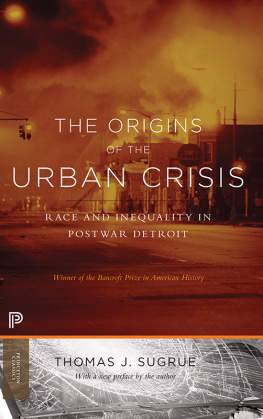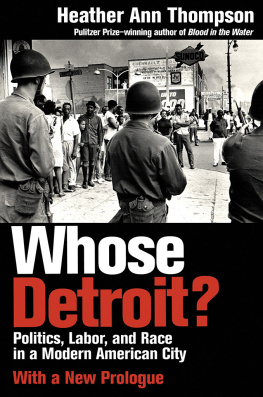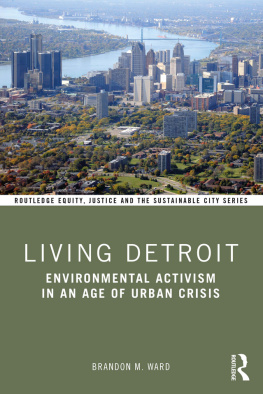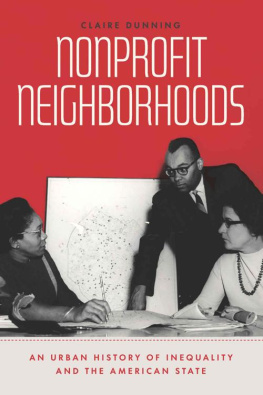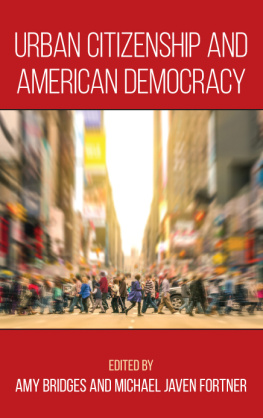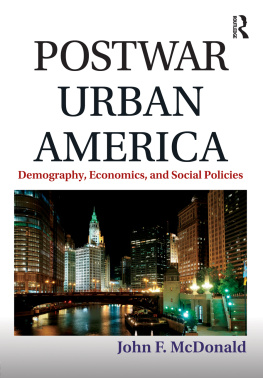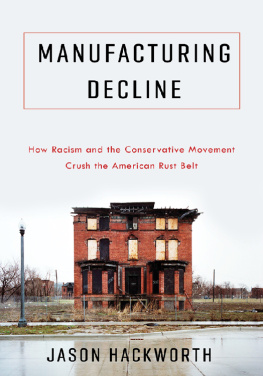BA | Burneice Avery Papers, DPL |
BEP | Boston-Edison Protective Association Papers, DPL |
CAH | Charles A. Hill Papers, ALUA |
CCR | Detroit Commission on Community Relations Collection, ALUA |
CHPC | Detroit Citizens Housing and Planning Council Papers, DPL |
CPC | Detroit ArchivesCity Plan Commission Papers, DPL |
CRC | Civil Rights Congress of Michigan Collection, ALUA |
DMP | Donald Marsh Papers, WSU-UA |
DNAACP | Detroit Branch National Association for the Advancement of Colored People Papers, ALUA |
DSL | Donald S. Leonard Papers, MHC |
DUL | Detroit Urban League Papers, MHC |
ECP | Edward Connor Papers, ALUA |
FHLBS | Federal Home Loan Bank System, Record Group 195, NA |
FK | Francis Kornegay Papers, MHC |
FM | Floyd McGriff Papers, MHC |
GMW | G. Mennen Williams Papers, MHC |
HOLC | Home Owners Loan Corporation, Record Group 39, NA |
Mayors Papers | Detroit ArchivesMayors Papers, DPL |
MDCC | Metropolitan Detroit Council of Churches Collection, ALUA |
MJ | Mildred Jeffrey Papers, ALUA |
NAACP | National Association for the Advancement of Colored People Papers, LC |
NUL | National Urban League Papers, LC |
RH | Robert Halbeisen Collection, ALUA |
RK | Rose Kleinman Papers, ALUA |
SEMCOG | Southeastern Michigan Council of Governments Collection, ALUA |
SLAA | South Lakeview Area Association Papers, DPL |
SMSJ | St. Matthew and St. Joseph Church Papers, MHC |
SP-AME | St. Paul AME Zion Church Papers, MHC |
UAW-CAP | United Automobile Workers Community Action Program Collection, ALUA |
UAW-FP | United Automobile Workers Fair Practices Department Collection, ALUA |
UAW-PAC | United Automobile Workers Political Action CommitteeRoy Reuther Collection, ALUA |
UAW-RD | United Automobile Workers Research Department Collection, ALUA |
UAW-WPR | United Automobile Workers PresidentWalter P. Reuther Collection, ALUA |
UAW-49 | United Automobile Workers Local 49 Collection, ALUA |
UAW-600 | United Automobile Workers Local 600 Collection, ALUA |
USWA-CRD | United Steel Workers of America Civil Rights Department Collection, PL |
VF | Vertical Files, ALUA |
WS | William Seabron Papers, ALUA |
Acknowledgments
THIS BOOK has deep roots in the academy, in friendships, and in family. Over the past two decades, I had the good fortune to have as my teachers a remarkable group of historians who have offered me models of humane and serious scholarship: Gerald E Moynahan, James P. Shenton, Alden T. Vaughan, Kenneth T. Jackson, Leonard Wallock, David Rothman, Jay M. Winter, Gareth Stedman Jones, Bernard Bailyn, Ernest May, and the late Nathan I. Huggins. Special thanks to Stephan Thernstrom and Barbara Gutmann Rosenkrantz who shepherded this project through its first incarnation as a dissertation. Their suggestions (even when I ignored them) and faith in my work made this book possible.
A number of friends have sustained me throughout this project, especially Eric Arnesen, Brian Balogh, Annamaria Basile, Sue Beale, Rosemary Byrne, Steve Conn, Sarah De Lone (and her friends in the UAW Legal Department), Harlan Eplan, Florence Farrell, Karen Farris, Tom Fennell, Beth Fordham-Meier, Rachelle Friedman, Tim Gilfoyle, Dan Gitterman, Greg Goldman, Kurt Hack, Sally Hadden, Diedra Harris-Kelley, Liz Hersh, Jana Hollingsworth, Tom Jackson, Felicia Kornbluh, Joseph Kearney, Jennifer Laszlo, Abby Letcher, Cecelia Lynch, Debi Maughan, Steve Maughan, Mark Meier, Sylvie Murray, Mike Neus, John Logan Nichols, Alice OConnor, Kevin ORourke, Max Page, Susan Schulten, Tom Schwartz, Tony Simonelli, John Skrentny, Jeannie Sowers, Gene Sperling, Marc Stein, Mark Stern, Monica Tetzlaff, Tom Warnke, and Rebecca Zeigler. My friends and students in Lowell House diverted me with countless hours of dining table conversation and camaraderie. John Simmons and the members of Painters District Council 35 brought me out of the ivory tower to places like Dorchester, Roxbury, South Boston, Fall River, and Lynn, and reminded me that politics can be empowering. When I was in Michigan doing research, Ken Horn introduced me to an Ann Arbor I did not know and drank a lot of coffee with me. Lars Waldorf deserves special mention for his inestimable contributions to my intellectual growth and personal sanity. His combination of rigorous analysis and political engagement continues to inspire and challenge me.
When I was just beginning this project, I had the good fortune to meet Michael B. Katz, who expressed a great deal of faith (which I hope is warranted) in a young, unknown historian. Michael also brought me into a group of scholars whose work and ideas have been very influential for mineThe Social Science Research Science Councils working group on history and the urban underclass. Two lively meetings of the authors of The Underclass Debate: Views from History gave me the invaluable opportunity to air my ideas as they developed, to discuss a lot of important work in progress, and to build some enduring friendships. Michael also read the entire manuscript and offered valuable suggestions and advice.
A number of other friends have also read drafts of this book in their entirety and pushed me to rethink many of my assumptions. Special thanks to Eric Arnesen (who offered an extraordinary set of comments and filled my mailbox right up until the last minute with photocopied newspaper clippings), Dana Barron, Peter Coclanis, Lizabeth Cohen, Gerald Gamm (and his Urban Politics students), Gary Gerstle, Jim Grossman, Ira Katznelson, Robin Kelley, and Robert Lieberman. Other sections of the book have benefited from the astute comments of Jo Ann Argersinger, David Bartelt, Kevin Boyle, Alan Brinkley, Rick Halpern, Arnold Hirsch, Alison Isenberg, Michael Kazin, Phil Klinkner, Dan Letwin, Nelson Lichtenstein, John McGreevy, James Morone, Bruce Nelson, Alice OConnor, James T. Patterson, Adolph Reed, Marshall Stevenson, and Roger Wilkins. Several audiences have listened carefully to parts of this manuscript, and I am deeply indebted to those whose collegiality and astute criticism have assisted my work. Thanks to participants in lively discussions at the Chicago Seminar on the City at the Chicago Historical Society, the Columbia Seminar on the City, the PARSS Seminar on Work and Welfare and the Urban Studies Seminar at the University of Pennsylvania, the Charles Colver Lecture at Brown University, the Labor History Seminar at Pennsylvania State University, the German Historical Institute Conference on Race and Ethnicity, and the Research-in-Progress Seminar at The Brookings Institution. Thanks also to the interested audiences and commentators at meetings of the American Historical Assocation, the Organization of American Historians, the Social Science History Association, the UNESCO Program for Comparative Research on Poverty, the American Political Science Association, the SSRC Conference on Persistent Urban Poverty, and the North American Labor History Conference. I cannot imagine a better editorial staff than at Princeton University Press. Not one, but two talented editors, Brigitta van Rheinberg and Lauren Osborne, have offered guidance and support as my project has worked its way from concept to book. And my lengthy manuscript benefited greatly from the keen eye of copy editor Gavin Lewis.

